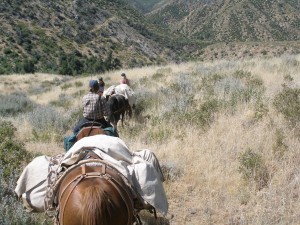It’s nearly 3 p.m. when we lucky seven pull out of the mouth of Horn Canyon and, a few minutes later, into the pack station, our ten horses bone-weary from six days on the trail, covering 65 miles or so of rugged Sespe backcountry.
 Or maybe that’s just me, projecting. I am bone-weary from my first full-length Thacher horsepacking trip. (In the fall, I backpack with the new 9th graders in the High Sierra, and, until this year, I’ve used the spring EDT days to write Senior Tributes.) The fatigue and pain is mostly in my right knee-bones, which, under everyday circumstances, click audibly when I bend my leg. Hours in the saddle, especially the last five miles down from the Ridge, make for a whole percussion section in there. So when I face Colby to the rail and dismount, I land on the ground crippled, my first steps bandy-legged and gimpy.
Or maybe that’s just me, projecting. I am bone-weary from my first full-length Thacher horsepacking trip. (In the fall, I backpack with the new 9th graders in the High Sierra, and, until this year, I’ve used the spring EDT days to write Senior Tributes.) The fatigue and pain is mostly in my right knee-bones, which, under everyday circumstances, click audibly when I bend my leg. Hours in the saddle, especially the last five miles down from the Ridge, make for a whole percussion section in there. So when I face Colby to the rail and dismount, I land on the ground crippled, my first steps bandy-legged and gimpy.
In my body’s unfolding, I’m reminded, oddly, of a line from a Robert Frost poem, a sort of companion poem to “Birches,” a girl rather than a boy in a tree. It’s called “Wild Grapes,” and I’ve loved it since a grad school professor introduced it to me decades ago. In the poem, the girl, once launched into the air by a springy birch branch, just hangs there helplessly, her shoes falling off, the tendons in her tiny wrists becoming “banjo strings.” She wants down, but doesn’t trust her brother to catch her if she lets go. Exasperated, he finally manages to bend the branch further, delivering her back to earth. The narrator says,
[O]nce I felt ground with my stocking feet
And the world came revolving back to me,
I know I looked long at my curled-up fingers,
Before I straightened them and brushed the bark off.
Remembering the girl she was, the speaker confesses to “not knowing anything” then talks of the principles of holding on and letting go, about the most basic act of trusting. She takes this day of awakening as a second birthday.
In my own straightening and brushing off–horse hair, dust–I know I’ve also learned something about trust these past six days. First, there’s the kind that evolves imperceptibly between rider and horse. Colby took us gamely through creek and river, up boulder-strewn trails, down steep hills with stair-steps made of railroad ties, across shale-slidey switchbacks, around the legendarily vertiginous Pucker Up Point. He stood still to be hobbled, dropped his head to take the bit, and flattened back his ears only on the final pre-ride cinching every morning.
Then, there’s trust of the conjugal sort. Years of living with a practical jokester inevitably made me wonder whether the information I was getting at certain points early on in the adventure was, shall we say, fully accurate: “This part’s not hard, Joy. Stand up in your stirrups and grab the mane to help your horse. Really. It’s easy.” It turned out to be true. So, too, when Michael’s chirpy “Red sky at night!” (following an hour of so of snow flurries at dusk on Pine Mountain) kept its side of the deal: sunshine and bluebird skies the next morning for our ride to Half Moon. Trust the Second built on Trust the First.
Finally, I learned something fairly new to me outside of the classroom, where my students are daily my teachers. On this trek, I let go of my pride and asked for advice daily: “So, Hutton, what’s the best way to handle Pucker Up Point?” “J-J, how do you relax your body when you know your horse is about to take one of those big hops up a rock the size of a refrigerator?” Shelby, Ciara, Lauren, too — each generously contributed some psychological comfort, assurance, or guidance at one point or another. (And in addition, they were can-do, will-do, want-to-do, every one of them.)
The world revolving back to me is changed, and I, in it, changed–at least a little–too. My legs stretch and realign as I walk from horse to tack room, tie-rail to washrack.
The knee’s just fine.